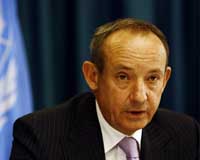| . |  |
. |
Bangkok (AFP) Sept 29, 2009 UN experts warned Tuesday that Asia-Pacific nations and other developing countries need support to combat climate change as they face an intensification of extreme weather such as the Philippine floods. The comments came as a divide between rich and poor nations continued to dominate crucial negotiations in Bangkok to develop a new climate treaty before world leaders meet in Copenhagen in December. UN climate chief Yvo de Boer said one of the "key elements" of a deal was increased support for developing countries in the Asia-Pacific region and elsewhere to step up efforts to deal with the effects of climate change. "Typhoons, floods and extreme weather events regularly make headlines in this part of the world," de Boer told reporters. De Boer said the devastation in the Philippines was "the most recent tragic example" of climate change affecting the region, as the death toll reached 240, with the same storm, Ketsana, also killing 22 people in Vietnam. "The impacts are likely to become more intense over time. Dealing with emergency situations, reducing disaster risks and increasing the climate resilience is a necessity for this region," he added. Indonesia became the latest country to announce plans for a cut in greenhouse gas emissions, saying it would cut them by more than a quarter. Campaigners have applauded recent encouraging announcements on climate change from Asian countries including China, India and Japan, which has pledged to reduce emissions by 25 percent from 1990 levels by 2020. Developed nations admit a historical responsibility for global warming but say developing countries should also pledge to curb their output, while emerging economies have called on rich nations to make higher cuts. President Susilo Bambang Yudhoyono made the pledge in a speech at a working lunch during the G20 summit in Pittsburgh on September 25 but it was only made public at the negotiations in the Thai capital, an Indonesian delegate said. Indonesia remains one of the leading forest destroyers, with emissions from the clearing of rainforests and peatlands making it the world's third-largest greenhouse gas emitter, according to some estimates. "We just want to tell the world that although the obligation is mainly, most of it, on developed countries, Indonesia as victims of climate change would like to do something to prevent it from worsening," senior delegate Agus Purnomo said. In Yudhoyono's speech, a copy of which was obtained by AFP, the president said Indonesia had decided on a national climate change action plan "that will reduce our emissions by 26 percent by 2020 from BAU (Business As Usual)." With international support Indonesia could reduce emissions by as much as 41 percent, Yudhoyono said. UN Under-Secretary General Noeleen Heyzer said the Asia-Pacific region had experienced 80 percent of global casualties related to extreme weather events over the last seven years. "Climate change is likely to increase both the frequency and intensity of extreme weather events as well as the number of related casualties," she told the briefing. Heyzer, also chief of the UN's Economic and Social Commission for Asia and the Pacific, said most developing countries in the region faced two inter-linked challenges: combating poverty and overcoming climate change. "Failure to tackle one will undermine efforts to deal with the other," she said. The transition towards a low carbon economy was already happening in the region but still required "massive investments," she added. The Bangkok talks are the second-to-last negotiating session before Copenhagen, the last chance to sign a deal to replace the Kyoto Protocol, which expires in 2012. Meanwhile conservation group WWF International released a survey saying that leading investors showed "significant support" for a scheme that would reward nations for saving their forests in any deal on global warming. Share This Article With Planet Earth
Related Links Climate Science News - Modeling, Mitigation Adaptation
 UN climate chief says time running out for deal
UN climate chief says time running out for dealBangkok (AFP) Sept 28, 2009 The UN climate chief warned Monday that time was running out to break a deadlock on a global warming pact, telling delegates in Bangkok that failure to do so by December would threaten future generations. The talks are the next to last before a showdown in Copenhagen at the end of the year, when the 192 countries must agree on a treaty for tackling greenhouse gases beyond 2010, after the ... read more |
|
| The content herein, unless otherwise known to be public domain, are Copyright 1995-2009 - SpaceDaily. AFP and UPI Wire Stories are copyright Agence France-Presse and United Press International. ESA Portal Reports are copyright European Space Agency. All NASA sourced material is public domain. Additional copyrights may apply in whole or part to other bona fide parties. Advertising does not imply endorsement,agreement or approval of any opinions, statements or information provided by SpaceDaily on any Web page published or hosted by SpaceDaily. Privacy Statement |